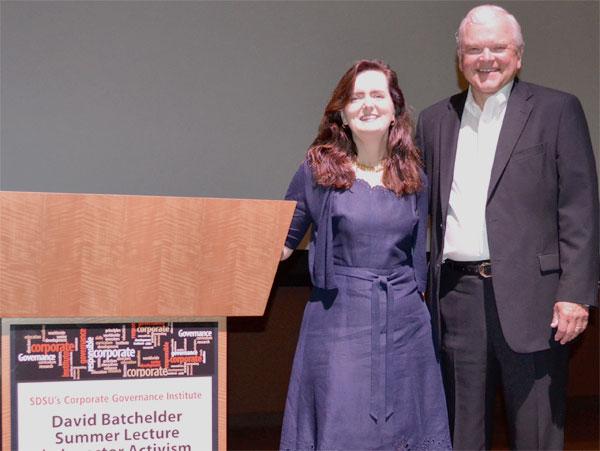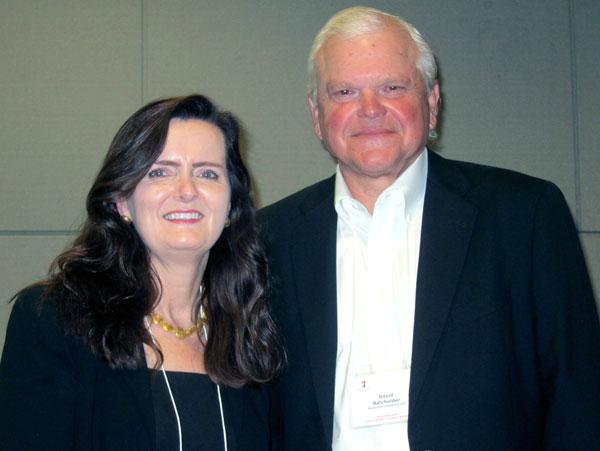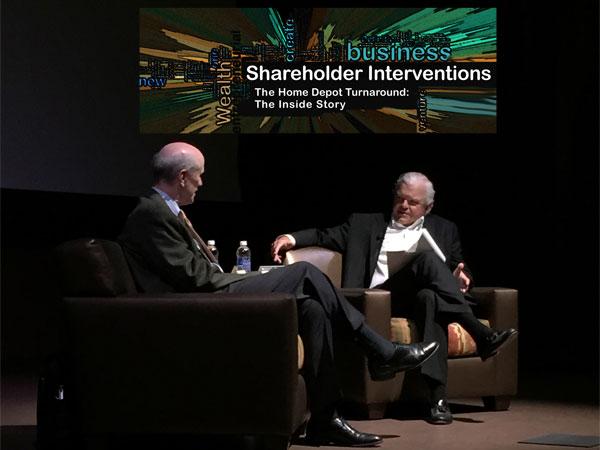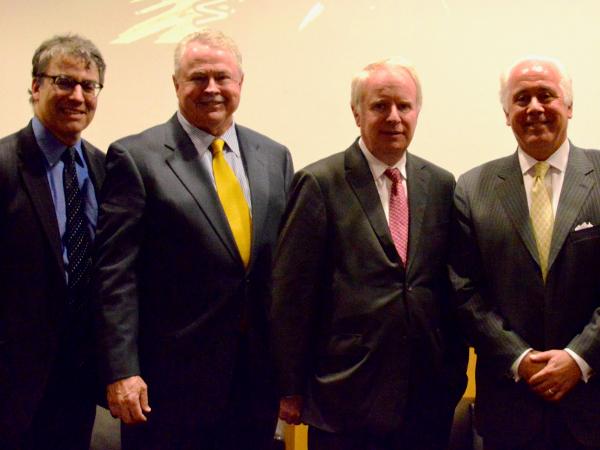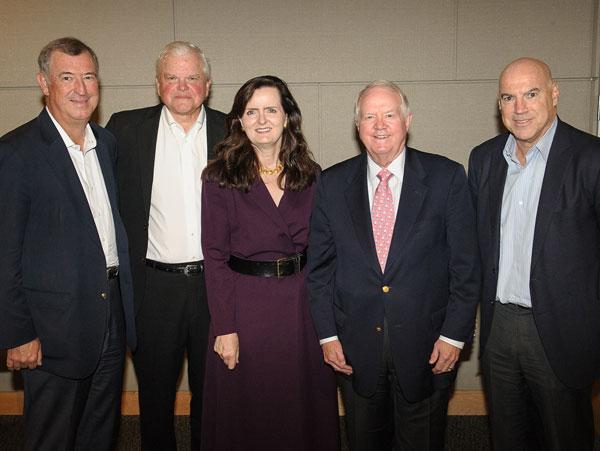Corporate Governance Institute
Vision
The Corporate Governance Institute strives to become known as a dominant center for the study and application of responsible corporate governance principles worldwide.
Mission
The Corporate Governance Institute (CGI) is a research and education center dedicated to the study and application of responsible corporate governance principles worldwide. The Institute's mission is to enhance the skills of corporate directors, investors, and senior executives through research and curriculum development. CGI programs focus on identifying and promoting responsible practices worldwide in all aspects of corporate governance. CGI seeks to support the Fowler College of Business, San Diego State University, and members of the local, national, and international communities in matters related to corporate governance.
Corporate Governance Institute Receives Endowed Chair and Shareholder Value Endowment

San Diego State University’s Fowler College of Business announced a $2.25 million gift from Batchelder/Washington Investments LLC to support its first endowed chair and a separate endowment for the university’s Corporate Governance Institute (CGI).
The Ralph V. Whitworth Chair in Corporate Governance, named in honor of leading pioneer in activist investing, Ralph Whitworth, was established by a $1.5 million gift. The gift comes with a dollar-for-dollar match from the Ron and Alexis Fowler Match for a total of $3 million. The Corporate Governance Institute also recieved a $750,000 gift for a Shareholder Value Endowment, with the match to toal $1.5 million.
Ralph Whitworth was a central player in advancing responsible investor activism, from advocating for the key “short slate” SEC rule change in the early 1990s through co-founding and building Relational Investors into a $6 billion investment fund based in San Diego. During his career as an activist investor, Whitworth served on 11 corporate boards, including Mattel, Waste Management, and Tektronix, and as Hewlett-Packard’s interim chairman of the board.
Corporate Governance Institute
Relational Investors co-founder David Batchelder and David Katz of Wachtell, Lipton, Rosen & Katz share a vision: The establishment of an endowed chair in corporate governance to honor pioneer Ralph Whitworth in his home city of San Diego. Their ongoing relationship with San Diego State University’s Corporate Governance Institute inspired the placement of the proposed chair at a leading California state school that has benefitted from few endowment investments. For more information about how to support the Ralph V. Whitworth Chair in Corporate Governance, contact:
Lori Verstegen Ryan, Ph.D.
Director, Corporate Governance Institute
Professor of Management
Fowler College of Business
San Diego State University
5500 Campanile Drive
San Diego, CA 92182
[email protected]
David A. Katz and Wachtell, Lipton, Rosen & Katz have established a 10-year $200,000 endowment for the Corporate Governance Institute, matched $200,000 through the generous support of Ron and Alexis Fowler. For more information about how to support the endowment, contact:
Lori Verstegen Ryan, Ph.D.
Director, Corporate Governance Institute
Professor of Management
Fowler College of Business
San Diego State University
5500 Campanile Drive
San Diego, CA 92182
[email protected]
Contact:
Lori Verstegen Ryan, Ph.D.
Director, Corporate Governance Institute
Professor of Management
Fowler College of Business
San Diego State University
5500 Campanile Drive
San Diego, CA 92182
[email protected]
Lowe's Goes High: The Aftermath of Investor Activism
Hosted by David Katz
with Richard Dreiling and David Batchelder
Lowe's Lead Director Richard Dreilling and activist investor David Batchelder discuss the activist's intervention with the company and what happened next.

Shareholder Activism: The Good, The Bad, and The Ugly
with guests Leo Strine and David Batchelder, and moderator David Katz
Guest speakers Chief Justice Leo Strine (ret.) and activist investor David Batchelder had a moderated discussion and Q & A on Investor Activism

An Organic Investment: Inside the HAIN Intervention
with guests Dawn Zier and Mark Schiller, and host Glenn Welling
In the wake of an accounting investigation that HAIN Celestial’s founder and then-CEO called “the year from hell,” Glenn Welling and his team at Engaged Capital acquired a 9.9% stake in the company. Their goals? To overhaul the Board and management team, clean up operations, and return the business to creating value for shareholders. After initial discussions, the founding CEO of 25 years stepped down and the newly minted Board hired Mark Schiller from Pinnacle Foods as the Company’s second CEO. The process resulted in new board members, an entirely new executive team, divestment of dozens of brands, a restructured cost structure and supply chain, and a return to growth for the company. Come hear how it all happened from Dawn Zier, current Chair of HAIN Celestial and former CEO of Nutrisystem, Mark Schiller, recently departed HAIN CEO, and Glenn Welling, the activist who got it all started.
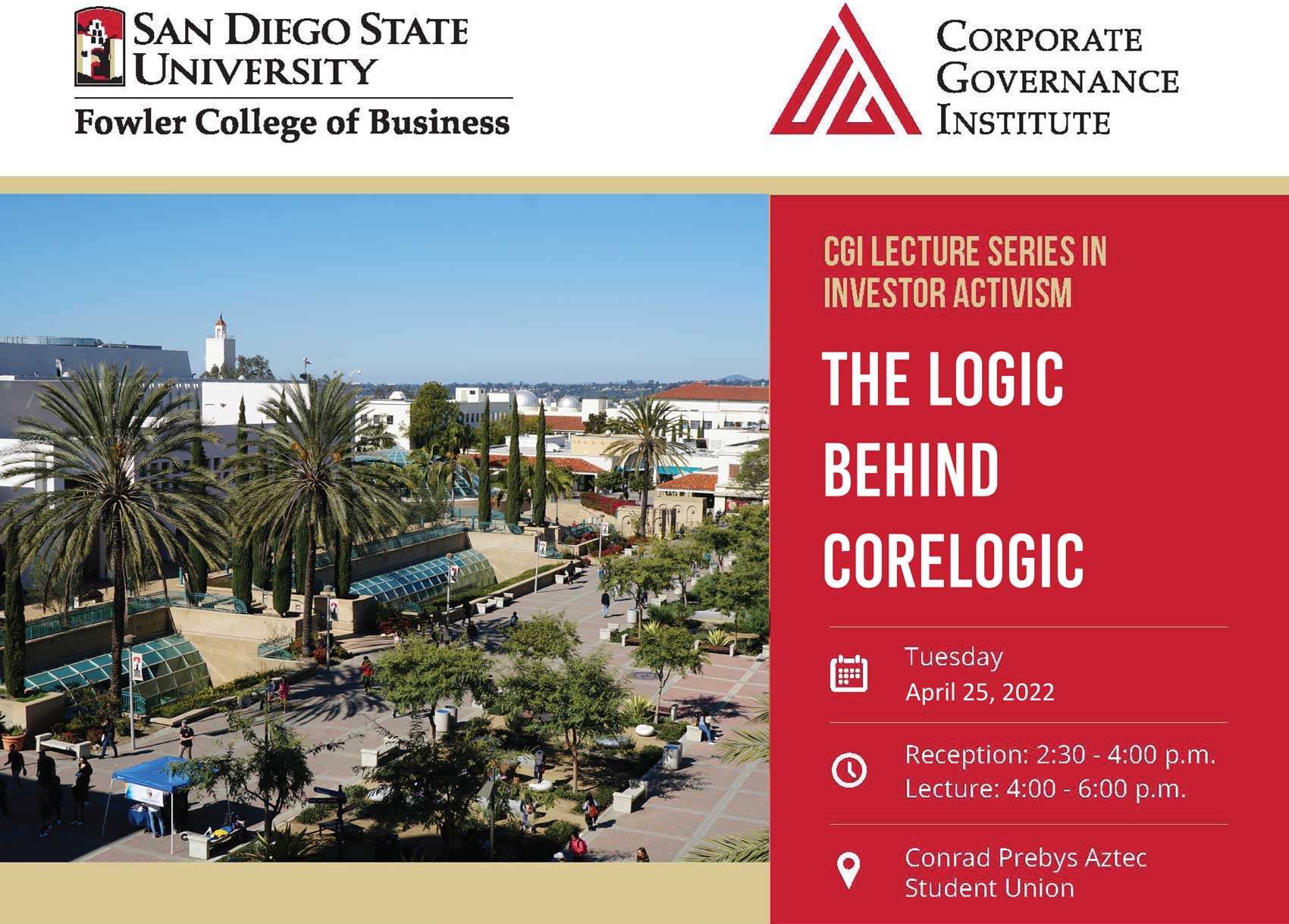
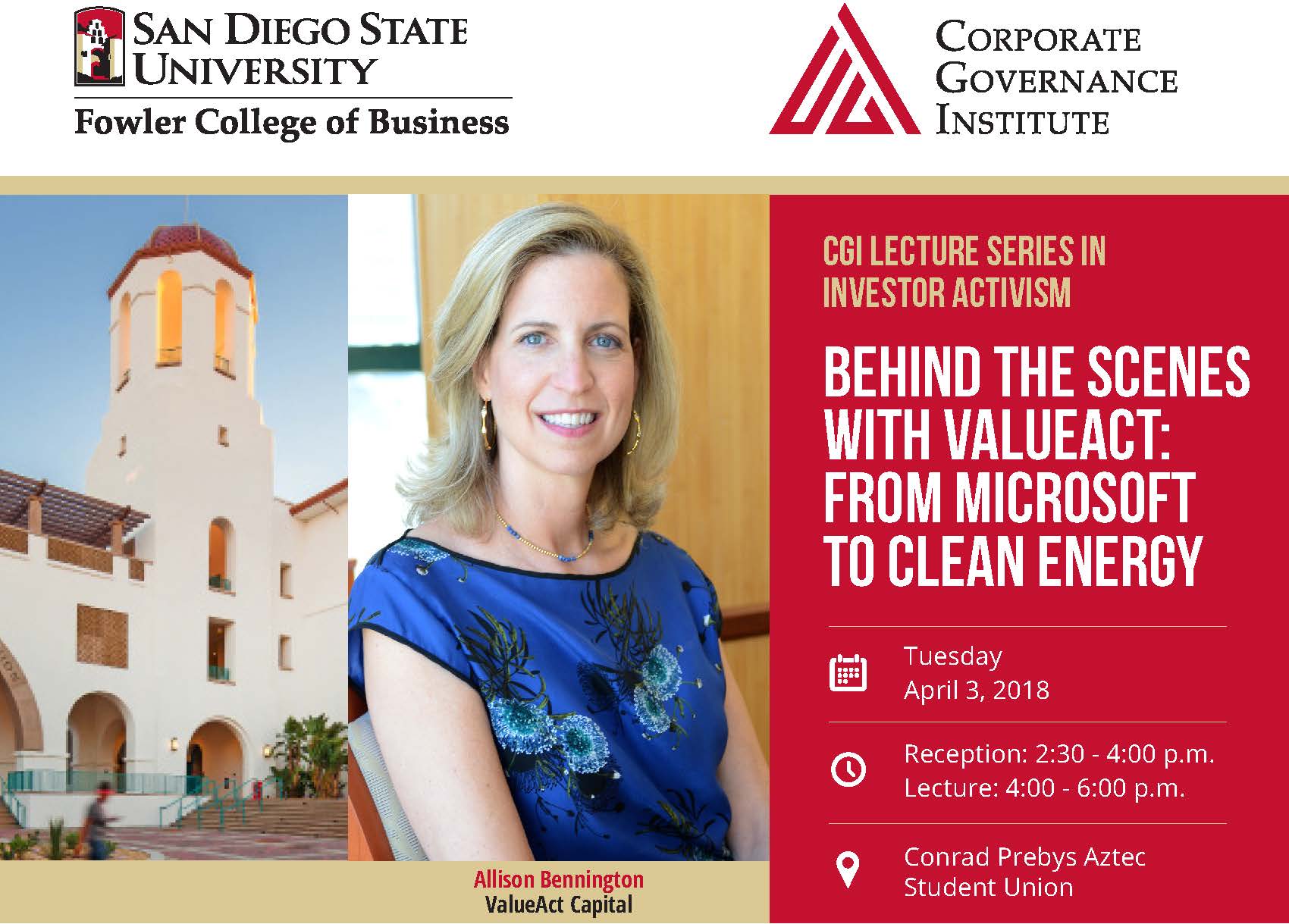
Microsoft, Rolls-Royce, Morgan Stanley, KKR
ValueAct has been there, engaging in its own form of constructive activism: taking stakes, building relationships, and serving on boards while driving earning skyward. Leading a new trend in 2018, they established the ValueAct Spring Fund, intended to focus public companies on Environmental, Sustainability, and Governance initiatives, and invested in energy producer AES, with a goal of increasing its production of clean energy. David A. Katz, of Wachtell, Lipton, Rosen & Katz, discussed these corporate interventions with ValueAct partner Allison Bennington, giving us a rare view behind the scenes with a leading–and very successful–activist investor.
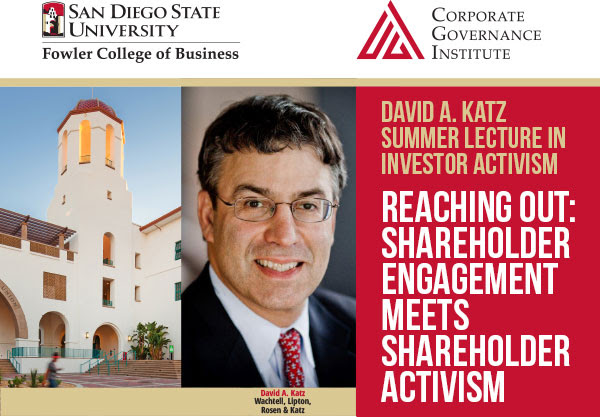
Allergan, Chesapeake, Hertz, Chipotle
All companies under fire that sought out the expert counsel of respected New York attorney David A. Katz, of Wachtell, Lipton, Rosen & Katz. Mr. Katz discussed the current Wall Street perspective on the nexus of companies reaching out to engage shareholders as activist shareholders continue to reach in to improve the performance and corporate governance of their targeted companies.
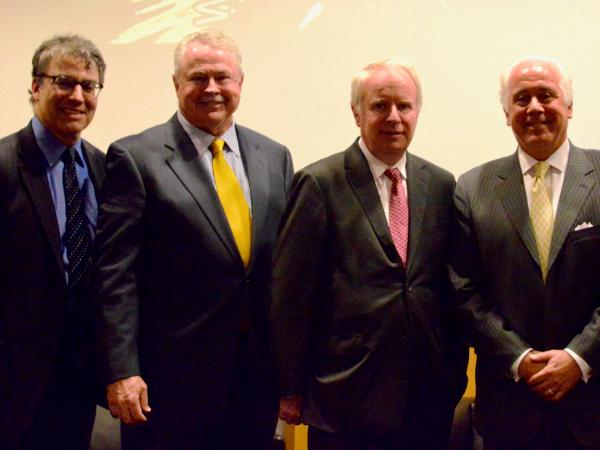
David Katz (l.) and Paul Tosetti (r.) query Allergan Inc. Chairman Mike Gallagher and CEO David Pyott at the 2016 The Allergan Intervention: A Company Fights Back event.
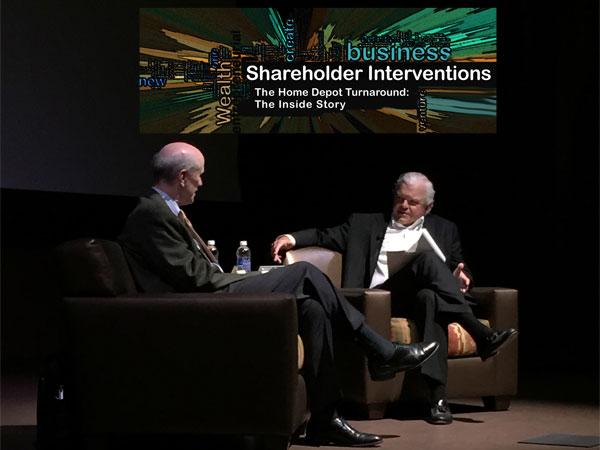
Relational Investors founder David Batchelder (r.), discusses recent events at Home Depot with Turnaround Chairman and CEO Frank Blake (l.), in February 2015, at The Home Depot Turnaround: The Inside Story event, part of CGI’s David Batchelder Lecture Series in Investor Activism.
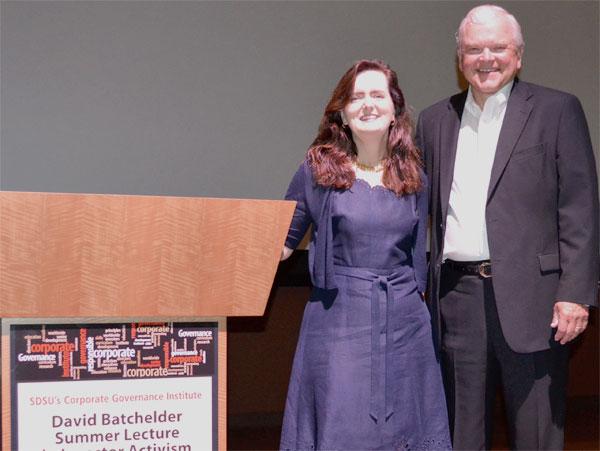
Relational Investors Founder David Batchelder with CGI Director Lori Ryan, at the June 2014 David Batchelder Summer Lecture in Investor Activism
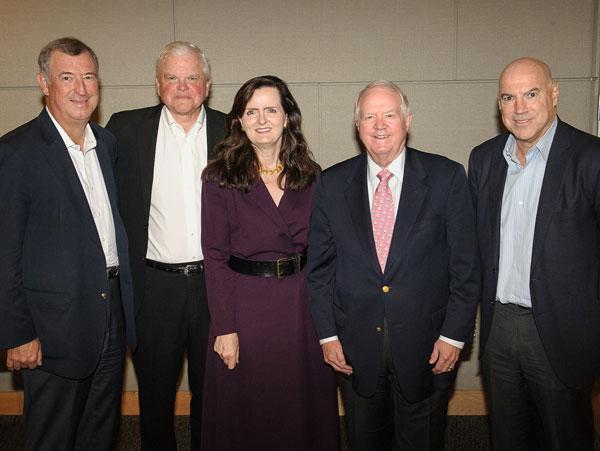
CGI hosted the "Shareholder Interventions of the Year" event in January 2014, with panelists (l to r) CVS Caremark Chairman Dave Dorman, Relational Investors founder and event host David Batchelder, Chesapeake Energy Chairman Archie Dunham, and Hewlett-Packard Chairman Ralph Whitworth, shown here with CGI Director Lori Ryan.
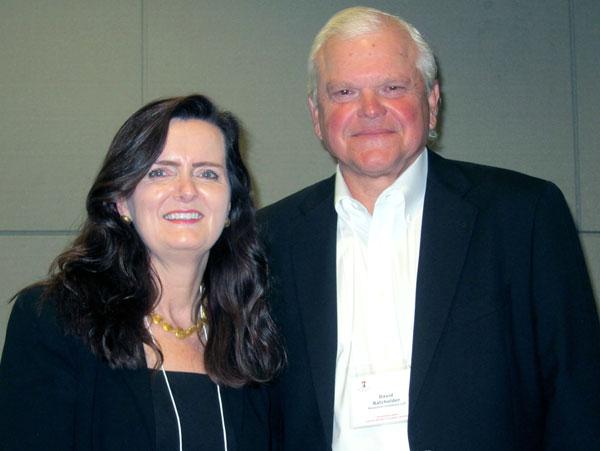
David Batchelder, co-founder of Relational Investors, spoke at the first CGI David Batchelder Lecture in Investor Activism event in June 2013, here with CGI Director Lori Ryan

Director Giles Bateman, CEO Susan Salka, and Investor Glenn Welling joined visiting scholars on a CGI public panel at SDSU in April 2011.
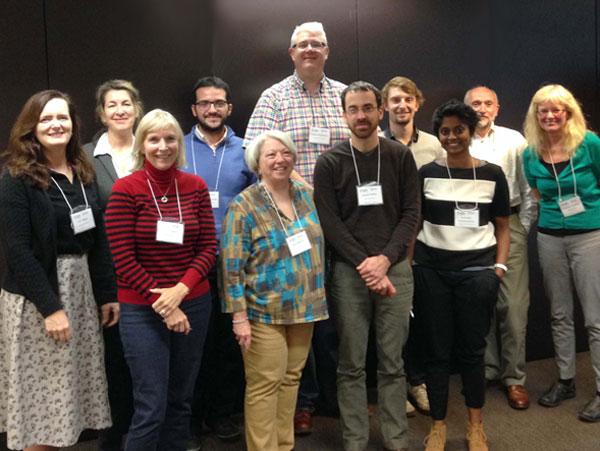
Eleven professors and doctoral students from six countries met in Sydney, Australia, for the 10th Annual Corporate Governance Research Workshop in June 2014. Left to right: CGI Director Lori Ryan; Rosemary Sainty, UTS Business School, Australia; Jill Brown, Bentley University, USA; Marco Minciullo, Università Cattolica del Sacro Cuore, Italy; Sara Morris, Old Dominion University, USA; Steve Brammer, University of Birmingham, UK; Jared Peifer, College of New York, USA; Gwenael Roudaut, Ecole Polytechnique, France; Pushpika Vishwanathan, Rotterdam School of Management, The Netherlands; Andrew Millington, University of Bath, UK; Kathy Rehbein, Marquette University, USA
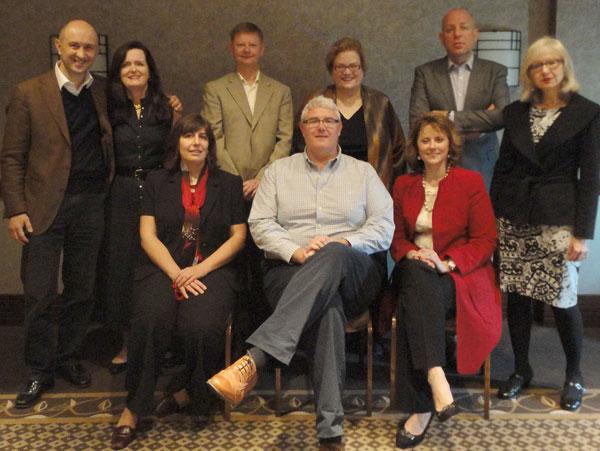
Teamed with Brock University, CGI gathered scholars from five countries to discuss their research into “Responsible Corporate Governance Principles Worldwide,” Niagara Falls, ON, May 2013
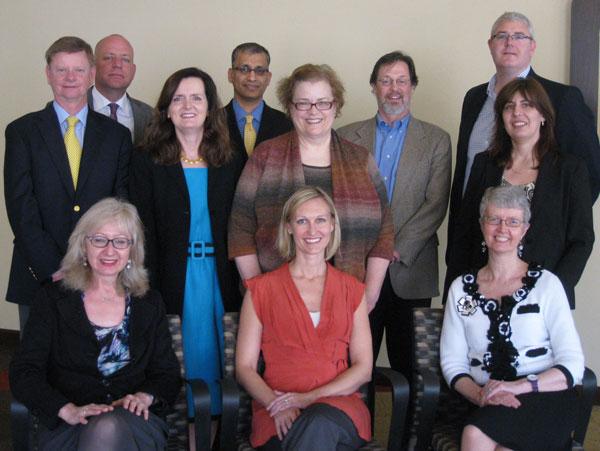
CGI hosted the 21st Century Corporate Governance scholarly colloquium with researchers from four countries, San Diego, April 2011
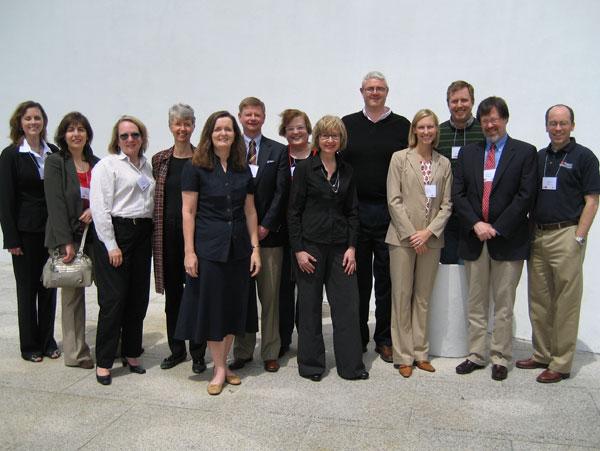
CGI co-hosted the “Corporate Governance: New Theories, Trends, and Evidence” scholarly colloquium with the University of St. Thomas, Houston, TX, April 2009

Garry Ridge
- Chairman and CEO, WD-40 Company
- Past Vice Chairman of the Board of the San Diego Foundation
- Past Chairman of the Board of the Corporate Directors Forum
Glenn Welling
- Principal and Chief Investment Officer, Engaged Capital, LLC
- Former Principal and Managing Director, Relational Investors
- Former Managing Director, Investment Banking Department’s Strategic Finance Group, Credit Suisse
- Board member, The Hain Celestial Group, Wharton Executive Education Board
- Previous boards include TiVo, Medifast, and Jamba

Jay Winship
- Founder and President, Pacific Point Capital LLC
- Board Member, CoreLogic and Bunge Limited
- Former Principal and Senior Managing Director of Relational Investors
- Previous boards include Esterline Technologies, Del Mar Database, and Excel National Bank
SDSU Corporate Governance Researchers

Director, SDSU Corporate Governance Institute
Lori Ryan's research focuses primarily on the intersection of business ethics and corporate governance, with a special emphasis on the roles, characteristics, and responsibilities of institutional and individual investors.
Maria Goranova and Lori Verstegen Ryan. 2021. “Revisiting the Corporate Objective: Shareholder Value Maximization in the Context of Contemporary Shareholder Practices.” Journal of Management Studies.
Maria Goranova and Lori Verstegen Ryan (Eds.). 2015. Shareholder Empowerment. New York: Palgrave Macmillan.
Maria Goranova and Lori Verstegen Ryan. 2014. "Shareholder Activism: An Interdisciplinary Review." Journal of Management. 40: 1230-1268.
Marguerite Schneider and Lori Verstegen Ryan. 2011. “Hedge Funds and Their Investor Activism: Do They Help or Hurt Other Equity Investors?” Journal of Management and Governance. 15: 349-374.
Lori Verstegen Ryan, Ann K. Buchholtz, and Robert W. Kolb. 2010. “New Directions in Corporate Governance and Finance: Implications for Business Ethics Research.” Business Ethics Quarterly. 20: 673-694.
Cynthia Clark Williams and Lori Verstegen Ryan. 2007. “Courting Shareholders: The Ethical Implications of Altering Corporate Ownership Structures.” Business Ethics Quarterly. 17: 669-688.
- Reprinted in C. Sri Krishna (Ed.). 2010. Corporate Ethics. Hyderbad, India: Icfai University Press Hyderabad. 196-221.
Melinda Vaughn and Lori Verstegen Ryan. 2006. “Corporate Governance in South Africa: A Bellwether for the Continent?” Corporate Governance: An International Review. 14: 502-512.
Lori Verstegen Ryan. 2006. “Foundation and Form of the Field of Business Ethics.” Journal of Private Enterprise. 22 (2): 34-49.
Lori Verstegen Ryan. 2005. “Corporate Governance and Business Ethics in North America: The State of the Art.” Business & Society. 44: 40-73.
- Reprinted in Jeremy Moon, Marc Orlitzky, and Glen Whelan (Eds.). 2011. Corporate Governance and Business Ethics. Northampton, MA: Edward Elgar Publishing.
- Reprinted in Deon Rossouw and Alejo Jose Sison (Eds.). 2006. Global Perspectives on the Ethics of Corporate Governance. New York: Palgrave MacMillan. 187-220.
Lori Verstegen Ryan and Marguerite Schneider. 2003. “Institutional Investor Power and Heterogeneity: Implications for Agency and Stakeholder Theories.” Business & Society. 42: 398-429.
Lori Verstegen Ryan and Bryan S. Dennis. 2003. “The Ethical Undercurrents of Pension-fund Management: Establishing a Research Agenda.” Business Ethics Quarterly. 13: 315-335.
- Reprinted in Thomas Clarke and Marie dela Rama (Eds.). 2007. Fundamentals of Corporate Governance. Thousand Oaks, CA: Sage Publications. Vol. 4: 36-53.
Lori Verstegen Ryan and Marguerite Schneider. 2002. “The Antecedents of Institutional Investor Activism.” Academy of Management Review. 27: 554-573.
- Reprinted in Thomas Clarke and Maria dela Rama (Eds.). 2007. Fundamentals of Corporate Governance. Thousand Oaks, CA: Sage Publications. Vol. 1: 301-325.
- Winner of the 2003 Financial Investments Award, sponsored by Seton Hall University and NJPRO Foundation.
Lori Verstegen Ryan and Ann K. Buchholtz. 2001. “Trust, Risk, and Shareholder Decision-making: An Investor Perspective on Corporate Governance.” Business Ethics Quarterly. 11: 177-193.
Lori Verstegen Ryan. 2000. “Shareholders and the Atom of Property: Fission or Fusion?” Business & Society. 39: 49-75.

Taekjin Shin’s research focuses on how social, psychological, and institutional factors affect corporate governance, particularly in the areas of executive compensation and executive succession.
Taekjin Shin. 2017. “Workforce Downsizing and Shareholder Value Orientation Among Executive Managers at Large U.S. Firms.” Research in the Sociology of Work: Emerging Conceptions of Work, Management and the Labor Market. 30: 185-217.
Taekjin Shin and Jihae You. 2017. “Pay for Talk: How the Use of Shareholder-value Language Affects CEO Compensation.” Journal of Management Studies. 5: 88-117.
Taekjin Shin. 2016. “Fair Pay or Power Play? Pay Equity, Managerial Power, and Compensation Adjustments for CEOs.” Journal of Management 42: 419-448.
Yuanyuan Sun and Taekjin Shin. 2014. “Rewarding Poor Performance: Why Do Boards of Directors Increase New Options in Response to CEO Underwater Options?” Corporate Governance: An International Review. 22: 408-421.
Taekjin Shin. 2014. “Explaining Pay Disparities Between Top Executives and Nonexecutive Employees: A Bargaining Power Approach.” Social Forces. 92: 1339-1372.
Taekjin Shin. 2013. “The Shareholder Value Principle: The Governance and Control of Corporations in the United States.” Sociology Compass. 7: 829-840.
Taekjin Shin. 2013. “Asian Immigrant Women in the U.S. Labor Market: A comparison of Migrant and Nonmigrant Koreans.” European Journal of Social and Humanistic Sciences. 2: 42-54.
Taekjin Shin. 2012. “CEO Compensation and Shareholder Value Orientation Among Large U.S. Firms. The Economic and Social Review 43(4): 535-559.
Taekjin Shin. 2012. “The Gender Gap in Executive Compensation: The Role of Female Directors and Chief Executive Officers (CEOs).” The Annals of the American Academy of Political and Social Science. 639: 256-276.
Taekjin Shin. 2009. “Earnings Onequality Within Organizations.” Social Science Research. 38: 225-238.
Taekjin Shin. 2008. “Profits and Pay at Large U.S. Corporations.” Best Paper Proceedings of the 2008 Academy of Management Meeting.
Taek-Jin Shin. 2007. “The Impact of Structural Dynamics on Job Mobility Rates in the United States.” Social Science Research. 36: 1301-1327.
Neil Fligstein and Taekjin Shin. 2007. “Shareholder Value and the Transformation of the U.S. Economy, 1984-2000. Sociological Forum. 22: 399-424.
Neil Fligstein and Taek-Jin Shin. 2003. “The Shareholder Value Society: A Review of the Changes in Working Conditions and Inequality in the U.S. 1976-2000.” Indicators 2(4): 5-43.

[email protected]
619-594-1011
Yan Luo’s research investigates the relationships among corporate governance, audit quality, and corporate disclosure in both U.S. and international settings. Her current research focuses on the economic consequences of governance quality; the determinants and consequences of the transparency of corporate disclosures; the determinants of audit quality; and the usefulness of auditing information to macroeconomists and equity market investors.
Lijun Lei, Yutao Li, and Yan Luo. 2019. “The Monitoring Role of Social Media: Evidence from Twitter Adoption and Corporate Political Disclosure Transparency.” Journal of Information Systems.
David G. DeBoskey, Yan Luo, and Linying Zhou. 2019. “CEO Power, Board Oversight, and Tone of Earnings Announcements.” Review of Quantitative Finance and Accounting.52: 657-680.
David G. DeBoskey, and Yan Luo. 2018. “Recent Trends of Corporate Political Disclosure for a Sample of S&P 500 Firms: A new and Emerging Corporate Disclosure Area.” International Journal of Disclosure and Governance. 15: 176-184.
David G. DeBoskey, Yan Luo, and Jeff J. Wang. 2018. “Does Board Gender Diversity Affect the Transparency of Corporate Political Disclosure?” Asian Review of Accounting. 26(4): 444-463.
David G. DeBoskey, Yan Luo, and Jeff J. Wang. 2018. “Do Specialized Board Committees Impact the Transparency of Corporate Political Disclosure? Evidence from S&P 500 Companies.” Review of Accounting and Regulation. 30: 8-19.
Yan Luo and Linying Zhou. 2017. “Managerial Ability, Tone of Earnings Announcement and Market Reaction.” Asian Review of Accounting. 25: 454-471.
Yan Luo and Victoria Krivogorsky. 2017. “The Materiality of Directors’ and Officers’ Insurance Information: Case for Disclosure.” Research in Accounting Regulation. 29: 69-74.
Janie Chang, Yan Luo, and Linying Zhou. 2017. “Audit Deficiency and Auditor Workload: Evidence from PCAOB Triennially Inspected Firms.” Review of Accounting and Finance. 16: 478-496.
Yutao Li and Yan Luo. 2017. “The Contextual Nature of the Association between Managerial Ability and Audit Fees.” Review of Accounting and Finance. 16: 2-20.
Yan Luo and Victoria Krivogorsky. 2016. “What Does Directors’ and Officers’ Liability Insurance Tells Us About Corporate Governance? Probing the Insurance Underwriting Process.” Corporate Governance: Principles, Practices, and Challenges: 199-211. New York: Nova Science Publishers.
Yan Luo and S. E. Salterio. 2014. “Governance Quality in a ‘Comply or Explain’ Governance Disclosure Regime.” Corporate Governance: An International Review. 22: 460–481.

[email protected]
619-594-2033
Jeff Wang's research explores the relationship among corporate governance, analyst forecasts, credit rating agency's responsiveness, options market's disciplinary role and information role, and voluntary disclosure quality. His current research focuses on the consequences of options listing and option trading volumes on the quality of corporate disclosure quality and the moderating role of corporate governance.
Francois Aubert, Jeff J. Wang, and Gary Grudnitski. 2019. “Convergence Consensus Analyst Earnings Estimates and Option Pricing in Modeling Material Accounting Misstatement.” Review of Accounting and Finance.
David G. DeBoskey, Yan Luo, and Jeff J. Wang. 2018. “Does Board Gender Diversity Affect the Transparency of Corporate Political Disclosure?” Asian Review of Accounting. 26(4): 444-463.
David G. DeBoskey, Yan Luo, and Jeff J. Wang. 2018. “Do Specialized Board Committees Impact the Transparency of Corporate Political Disclosure? Evidence from S&P 500 Companies.” Review of Accounting and Regulation. 30: 8-19.

[email protected]
619-594-4749
Yaoyi Xi’s research focuses on empirical corporate finance. He investigates how executives’ personal traits and social capital affect corporate decision making, particularly in the areas of board of directors, capital structure, and insider trading.
M. Babajide Wintoki and Yaoyi Xi. 2019. “Partisan Bias in Fund Portfolios.” Journal of Financial and Quantitative Analysis.
Stephen Haggard and Brian Walkup, Yaoyi Xi. 2015. “Short-term Performance of U.S.-bound Chinese IPOs.” The Financial Review. 50(1): 121-141.

[email protected]
(619) 594-2376
David DeBoskey's research explores the effects of corporate governance on loss provisions and earnings management in the banking industry, and corporate transparency and its impact on cost of capital and CEO compensation, including accounting for stock options. He also examines the impact of ownership concentration on the use of outside contractors, which can be directly linked to firms' corporate governance structure.
David G. DeBoskey, Yan Luo, and Linying Zhou. 2018. “CEO Power, Board Oversight, and Tone of Earnings Announcements.” Review of Quantitative Finance and Accounting.
David G. DeBoskey, Yan Luo, and Jeff J. Wang. 2018. “Do Specialized Board Committees Impact the Transparency of Corporate Political Disclosure? Evidence from S&P 500 Companies.” Review of Accounting and Regulation.
David DeBoskey and Wei Jiang. 2012. “Earnings Management and Auditor Specialization in the Post-SOX Era: An Examination of the Banking Industry.” Journal of Banking and Finance. 36: 613-623.
David DeBoskey and Peter Gillett. 2011. “The Impact of Multi-dimensional Corporate Transparency on U.S. Firms' Credit Ratings and Cost of Capital.” Review of Quantitative Finance and Accounting.
David DeBoskey and Kevin Lightner. 2011. “Accounting for Stock Options: A Comparative Simulation for Straight-Line and Graded Vesting Attributions Methods.” CPA Journal, August: 50-53.
Leon Chan, David DeBoskey, and Gene Whittenburg. 2009. “The Impact of the Managerial Ownership Concentration on the Usage of Independent Contractors in Operations.” Journal of Business and Behavioral Sciences, 20(2): 69-86.

[email protected]
(619) 594-4845
Chamu Sundaramurthy's current research lies at the interface of strategic management, corporate governance, entrepreneurship, and innovation. She has studied the interrelationships among corporate governance mechanisms (such as boards of directors), governance and strategic decisions of firms, shareholder actions, and firm performance in large public corporations. Her current research on governance focuses on family businesses and IPO firms, and her emerging interest is in the alignment between governance and innovation in social enterprises.
Chamu Sundaramurthy, Kuntara Pukthuanthong-Le & Yasemin Kor. 2014. “Positive and Negative Synergies between the CEO’s and the Corporate Board’s Human and Social Capital: A Study of Bio-technology Firms.” Strategic Management Journal. 35: 845–868.
Yasemin, Kor. and Chamu Sundaramurthy. 2009. “Experience-based human capital and social capital of outside directors.” Journal of Management, 35: 981- 1006.
Chamu Sundarammurthy. 2008. “Sustaining Trust within Family Businesses.” Family Business Review, 21: 89-102.
- Top 10 downloaded articles from FBR in 2008.
Chamu Sundaramurthy and Michelle Dean. 2008. “Family Business Openness to External Influence and International Sales: An Empirical Examination.” Multinational Business Review, 16.
Chamu Sundaramurthy and Glen E. Kreiner. 2006. “Governing by Managing Identity Boundaries: The Case of Family Businesses.” Entrepreneurship Theory & Practice. 32: 415-436.
Chamu Sundaramurthy, Dawna L. Rhoades, and Paula L. Rechner. 2005. “A Meta-analysis of the Effects of Executive and Institutional Ownership on Firm Performance.” Journal of Managerial Issues. 17: 494-510.
Chamu Sundaramurthy and Marianne Lewis. 2003. “Control and Collaboration: Paradoxes of Governance.” Academy of Management Review. 28: 397-415.
Chamu Sundaramurthy. 2002. “Style Over Substance? Hands-on or Hands-off?” Board Member. June: 8-9.
Dawna Rhoades, Paula Rechner, and Chamu Sundaramurthy. 2001. “A Meta-analysis of Board Leadership Structure and Organizational Performance: Are 'Two Heads Better Than One?'” Corporate Governance: An International Review. 9: 311-319.
Chamu Sundaramurthy. 2000. “Antitakeover Provisions and Shareholder Interests: A Review and a Contingency Model.” Journal of Management. 5: 1005-1030.
Dawna Rhoades, Paula Rechner, and Chamu Sundaramurthy. 2000. “Board Composition and Financial Performance: A Meta-analysis of the Influence of Outside Directors.” Journal of Managerial Issues. 12: 76-91.
Chamu Sundaramurthy and Doug Lyon. 1998. “Potential Conflict of Interests between Inside and Outside Shareholders: The Case of Shareholder Governance Proposals.” Journal of Managerial Issues. 10: 30-44.
James Mahoney, Chamu Sundaramurthy, and Joseph Mahoney. 1997. “The Effects of Corporate Antitakeover Provisions on Long-Term Investment: Empirical Evidence.” Managerial and Decision Economics. 18: 1-17.
Chamu Sundaramurthy, Joseph Mahoney, and James Mahoney. 1997. “Board Structure, Type of Antitakeover Provision, and Stock Price Effects.” Strategic Management Journal. 18: 231-245.
Chamu Sundaramurthy and Paula Rechner. 1997. “Conflicting Shareholder Interests: An Empirical Analysis of Fair Price Provisions.” Business & Society. 36: 73-87.
James Mahoney, Chamu Sundaramurthy, and Joseph Mahoney. 1996. “The Differential Impact on Stockholder Wealth of Various Antitakeover Provisions.” Managerial and Decision Economics. 17: 531-549.
Chamu Sundaramurthy, Paula Rechner, and Weiran Wang.1996. “Governance Antecedents of Board Entrenchment: The Case of Classified Board Provisions.” Journal of Management. 22: 783-799.
Chamu Sundaramurthy. 1996. “Corporate Governance within the Context of Antitakeover Provisions.” Strategic Management Journal. 17: 377-394.

[email protected]
(619) 594-8346
Martina Musteen's research focuses on how corporate governance practices affect firms' decisions to internationalize. She is also interested in how board structure impacts corporate reputation.
Martina Musteen, Deepak Datta, & Benedict Kemmerer. 2010. “Corporate Reputation: Do Board Characteristics Matter?” British Journal of Management. 21: 498-510.
Deepak Datta, Martina Musteen, & Pol Herrmann. 2009. “Board Characteristics, Managerial Incentives and the Choice between Foreign Acquisitions and International Joint Ventures.” Journal of Management. 35: 928-953.
Martina Musteen, Deepak Datta, & Pol Herrmann. 2009. “Ownership Structure and CEO Compensation: Implications for the Choice of Foreign Market Entry Mode.” Journal of International Business Studies. 40: 321-338.
Past CGI Research Fellows

Rutgers University
In memoriam, September 14, 2015
Selected Publications
Ann K. Buchholtz and Jill A. Brown. 2015. Shareholder Democracy as a Misbegotten Metaphor.” In Maria Goranova and Lori Verstegen Ryan (Eds). Shareholder Empowerment: 81-102. New York: Palgrave-Macmillan.
Jill Brown, Ann K. Buchholtz, Marcus Stewart, and Brian Dennis. 2012. “Board Diversity as a Camouflage Signal.” Academy of Management Best Paper Proceedings, Boston, MA.
Lori Ryan, Ann K. Buchholtz, and Robert Kolb. 2010. “New Directions in Corporate Governance and Finance: Implications for Business Ethics Research.” Business Ethics Quarterly. 20: 673-694.
Archie Carroll and Ann K. Buchholtz. 2010. “Educating Students in Corporate Governance and Ethics.” In Diane Swanson and Dann Fischer (Eds.), Advancing Business Ethics Education in the 21st Century. Charlotte, NC: IAP Publishing.
Ann K. Buchholtz, Jill Brown, Anne Anderson, and Kareem Shabana. 2009. “The Shareholder Democracy Paradox:An Empirical Examination,” Academy of Management Best Paper Proceedings, Chicago, IL.
Ann K. Buchholtz, Jill Brown, and Kareem Shabana. 2008. “Corporate Social Responsibility and Corporate Governance.” In Andrew Crane, Abagail McWilliams, Dirk Matten, Jeremy Moon, and Donald Siegel (Eds.), Oxford Handbook of Corporate Social Responsibility. Oxford, UK: Oxford University Press.
Matthew Rutherford and Ann K. Buchholtz. 2007. “An Investigation into Board Process: Examining How Outside Directors Attempt to Overcome Information Asymmetry.” Corporate Governance: An International Review. 15: 576-584.
Ann K. Buchholtz, Allen C. Amason, and Matthew A. Rutherford. 2005. “The Impact of Board Monitoring and Involvement on Top Management Team Affective Conflict.” Journal of Managerial Issues. 17: 405-422.
Mark A. Ciavarella, Ann K. Buchholtz, Christine M. Riordan, Robert D. Gatewood, and Garnett S. Stokes. 2004. “The Big Five and Venture Survival: Is There a Linkage?” Journal of Business Venturing. 19: 465-483.
Michael Young, Ann K. Buchholtz, and David Ahlstrom. 2003. “How Can Board Members be Empowered if They are ‘Spread Too Thin’”? S.A.M. Advanced Management Journal. 68(4): 4-11.
Ann K. Buchholtz, Barbara Ribbens, and Irene Houle. 2003. “Takeover Resistance and Executive Succession.” Academy of Management Journal. 46: 506-514.
Hettie Richardson, Allan C. Amason, Ann K. Buchholtz, and Joe Gerard. 2003. “CEO Willingness to Delegate to the Top Management Team: The Influence of Organizational Performance.” International Journal of Organizational Analysis. 10(2): 134-146.
Deb Kidder and Ann K. Buchholtz. 2002. “Can Excess Bring Success? CEO Compensation and the Psychological Contract.” Human Resource Management Review. 12: 599-618.
Michael N. Young and Ann K. Buchholtz. 2002. “Relational Demography in the Boardroom: The Case of the Compensation Committee and the CEO.” Journal of Managerial Issues. 14(3): 296-314.
William Schulze, Richard Dino, Michael Lubatkin, and Ann K. Buchholtz. 2001. “Agency Relationships in Family Firms: Theory and Evidence.” Organization Science. 12(2): 99-116.
Lori Verstegen Ryan and Ann K. Buchholtz. 2001. “Trust, Risk, and Shareholder Decision-making: An Investor Perspective on Corporate Governance.” Business Ethics Quarterly. 11: 177-193.
Ann K. Buchholtz, Michael Lubatkin, and Hugh O’Neill. 1999. “Seller Responsiveness to the Need to Divest.” Journal of Management. 25: 633-652.
Ann K. Buchholtz, Allan C. Amason, and Matthew Rutherford. 1999. “Beyond Resources: The Mediating Effect of Top Management Discretion and Values on Corporate Philanthropy.” Business & Society. 38: 167-187.
Ann K. Buchholtz, Michael Young, and Gary Powell. 1998. “Are Board Members Pawns or Watchdogs? The Link Between CEO Pay and Firm Performance.” Group and Organization Management. 23(1): 6-26.
Ann K. Buchholtz and Barbara Ribbens. 1994. “The Role of the CEO in Takeover Resistance: Effects of CEO Incentives and Individual Characteristics.” Academy of Management Journal. 37: 554-579.

University of San Diego School of Law
Selected Publications
Books
Jeffrey D. Bauman, Alan R. Palmiter, and Frank Partnoy. Corporations Law and Policy: Materials and Problems. 2005 and 2006 supplements, 6th ed. forthcoming 2007. Eagan, MN: Thomson West.
Frank Partnoy. 2003. Infectious Greed: How Deceit and Risk Corrupted the Financial Markets. New York: Henry Holt/Times Books.
Frank Partnoy. 1997. F.I.A.S.C.O.: Blood in the Water on Wall Street. New York: W.W. Norton.
Articles and Chapters
CNV Krishnan, Frank Partnoy, and Randall Thomas. 2016. “The Second Wave of Hedge Fund Activism: The Importance of Reputation, Clout, and Expertise.” Journal of Corporate Finance. 40: 296-314.
Alon Brav, Wei Jiang, Frank Partnoy, and Randall Thomas. 2008. “Hedge Fund Activism, Corporate Governance, and Firm Performance.” The Journal of Finance. 63: 1729-1775.
Frank Partnoy and Randall Thomas. 2007. “Gap Filling, Hedge Funds, and Financial Innovation,” In Yasuyuki Fuchita and Robert E. Litan (Eds.), Brookings-Nomura Papers on Financial Services. Washington, DC: Brookings Institution Press.
Frank Partnoy and David A. Skeel, Jr. 2007.“The Promise and Perils of Credit Derivatives.” University of Cincinnati Law Review 76. (Invited symposium.)
Frank Partnoy. 2006. “Financial Innovation and Corporate Law.” Journal of Corporation Law. 36: 799-827. (Invited symposium.)
Frank Partnoy. 2006. “How and Why Credit Rating Agencies Are Not Like Other Gatekeepers.” In Yasuyuki Fuchita and Robert E. Litan (Eds.), Financial Gatekeepers: Can They Protect Investors? Washington, DC: Brookings Institution Press. 59-99.
Shaun P. Martin and Frank Partnoy. 2005. “Encumbered Shares.” University of Illinois Law Review. 3: 775-813.
Frank Partnoy. 2004. “Enron and the Derivatives World.” In Nancy B. Rapoport and Bala G. Dharan (Eds.), Enron: Corporate Fiascos and Their Implications. New York: Thomson-Foundation Press. 169-186.
Frank Partnoy. 2004. “Strict Liability for Gatekeepers: A Reply to Professor Coffee.” Boston University Law Review. 84: 365-375. (Invited symposium.)
Frank Partnoy. 2003. “A Revisionist View of Enron and the Sudden Death of ‘May’.” Villanova Law Review. 48: 1245-1280. (Invited symposium.)
- Reprinted in Paul Dembinski, Carole Lager, Andrew Cornford, and Jean-Michel Bonvin (Eds.). 2005. Enron and World Finance: A Case Study in Ethics. 54-89.
Frank Partnoy. 2001. “Barbarians at the Gatekeepers? A Proposal for a Modified Strict Liability Regime.” Washington University Law Quarterly. 79: 491-547. (Invited symposium.)
Frank Partnoy. 1999. “The Siskel and Ebert of Financial Markets: Two Thumbs Down for the Credit Rating Agencies.” Washington University Law Quarterly. 77: 619-712.
- Reprinted 2001 in Securities Law Review. 33: 161.

New Jersey Institute of Technology
Retired
Selected Publications
Alix Valenti and Marguerite Schneider. 2012. “Exploring the Effects of Managerial Ownership on the Decision to Go Private: A Behavioral Agency Model Approach.” Administrative Issues Journal.
Alix Valenti and Marguerite Schneider. 2011. “A Property Rights Analysis of Newly Private Firms: Opportunities for Owners to Appropriate Rents and Partition Residual Risks.” Business Ethics Quarterly, 21: 445-472.
Marguerite Schneider and Lori Verstegen Ryan. 2011. “Hedge Funds and Their Investor Activism: Do They Help or Hurt Other Equity Investors?” Journal of Management and Governance. 15: 349-374.
Marguerite Schneider. 2010. “Public Pension Plan Funding: Can We Honor the Promises Made?” Book Review, State and Local Pension Plan Management, by J. Peng. Public Administration Review. 70: 648-649.
Paul Cox and Marguerite Schneider. 2010. “Is Corporate Social Performance a Criterion in the Overseas Investment Strategy of U.S. Pension Plans?” Business & Society. 49: 252-289.
Marguerite Schneider and Alix Valenti. 2010. “The Effects of Going Private: The Newly Private Corporation and the Dimensions of Corporate Performance.&rdquo Business & Society Review. 115: 76-106.
Marguerite Schneider. 2005. “The Status of U.S. Public Pension Plans: A Review with Policy Considerations.” Review of Public Personnel Administration. 25(2), 107-137.
Lori Verstegen Ryan and Marguerite Schneider. 2003. “Institutional Investor Power and Heterogeneity: Implications for Agency and Stakeholder Theories.” Business & Society. 42: 398-429.
Lori Verstegen Ryan and Marguerite Schneider. 2002. “The Antecedents of Institutional Investor Activism.” Academy of Management Review. 27: 554-573.
- Winner of the 2003 Financial Investments Award, sponsored by Seton Hall University and NJPRO Foundation.
Marguerite Schneider and Fariborz Damanpour. 2002. “Public Choice Economics and Public Pension Plan Funding: An Empirical Test.” Administration & Society. 34: 57-86.
Marguerite Schneider and Fariborz Damanpour. 2001. “Determinants of Public Pension Plan Investment Return: The Role of Fund Value Maximization and Public Choice Theory.” Public Management Review. 3: 551-574.
Marguerite Schneider. 2000. “When Financial Intermediaries are Corporate Owners: An Agency Model of Institutional Ownership.” Journal of Management and Governance. 4: 207-237.
Corporate Governance Resources
Corporate Governance
Since 1995 the Corporate Governance site at CorpGov.net has facilitated the ability of institutional and individual shareowners to better govern corporations, enhancing both corporate accountability and the creation of wealth. News, links, commentary, corporate governance definitions and advocacy geared to the active investor. Browse our small reference library, join our NETwork, subscribe to the publications of our stakeholders.
Corporate Governance: An International Review
The mission of Corporate Governance: An International Review (CGIR) is to publish cutting-edge research on the phenomena of comparative corporate governance throughout the global economy. CGIR acts as a forum for the exchange of information, insights and knowledge based on both theoretical development and practical experience. It is committed to publishing rigorous and relevant research on corporate governance so that the practice of corporate governance can be influenced and improved throughout the world.
Corporate Governance: The International Journal of Business in Society
The journal aims to cultivate and share knowledge and ideas in order to assist businesses to enhance their corporate governance practice. Being international and inter-disciplinary in scope, this journal seeks to provide a platform for debate amongst diverse academic and practitioner communities who address a broad spectrum of corporate governance issues and disciplines in different parts of the world.
Directors and Boards
Directors & Boards is a quarterly journal dedicated to the topics of leadership and corporate governance. Its readers are at the very pinnacle of business – board chairmen, CEOs and members of senior management, corporate board members, and board advisers.
Directors & Boards was founded in 1976, just as the Securities & Exchange Commission was taking an aggressive stance on the accountabilities of corporate boards of directors. For the past 23 years, Directors & Boards has been the undisputed information source and intellectual thought leader in the field of corporate governance.
Directorship
Directorship is committed to providing board directors with the information they need in this new era of corporate governance, through our magazine Directorship, website Directorship.com, Boardroom Forums, newsletters and daily news.
Governance
Governance is a monthly newsletter authoritative, providing international news and analysis on corporate governance, boardroom performance and shareholder activism. It is essential reading for board directors, senior executives, investment professionals and their advisers.
IUP Journal of Corporate Governance
The IUP Journal of Corporate Governance is a quarterly journal focusing on governance and ethics framework, role of boards, role of CEOs, CFOs and other senior management, role of other stakeholders, disclosure and transparency, regulation and best governance practices.
International Journal of Business Governance and Ethics
As the world becomes increasingly dominated by interconnected corporations alongside increasing demands for transparency and accountability, business governance is no longer just about running companies and organizations efficiently, but about managing wider responsibilities. Company directors need to move beyond governance concerns that deal with their functional responsibilities towards understanding how their personal values and actions affect the organizations they lead, and how in turn these affect local and global communities. IJBGE provides a professional forum to address these issues.
Journal of Management and Governance
The Journal of Management and Governance (JMG) is dedicated to advancing the understanding of corporate governance issues within and throughout privately-held firms, publicly-held corporations and government-controlled organizations. The journal is devoted to exploring the links between management and governance through both theoretical analyses and empirical investigations to improve the understanding of all the rules, codes, principles, practices, processes, mechanisms, structure and relationships, as well as institutions, networks and individuals affecting the way firms and organizations are managed, administered and controlled. Analyzed are strategies and decision-making; accounting, reporting and information control; measurement issues in governance; relational, cognitive and behavioral based; institutional economics. Contributions from all areas of business administration (accounting and control, general and strategic management, organizational theory and behavior, finance and banking) and manuscripts concerning both the private and the public sectors are welcome to the extent that they contribute to these general issues and to the understanding of governance thus broadly defined.
National Association of Corporate Directors
NACD advances exemplary board leadership - for directors, by directors. Our team provides the information and insights that board members rely upon to confidently navigate business challenges and enhance long-term shareowner value. Importantly, directors and boards turn to NACD to gain the knowledge and wisdom to become a strategic asset to their companies, and NACD amplifies the collective voice of directors in the national dialogue on board governance issues. NACD is the Voice of the Director. This is not corporate speak: Our entire organization is focused on meeting the needs of board members, and supporting directors to perform more effectively and efficiently.
Pensions and Investments
With unmatched integrity and professionalism, Pensions & Investments consistently delivers news, research and analysis to the executives who manage the flow of funds in the institutional investment market. Since its founding in 1973, this continues to be the mission of Pensions & Investments, the international newspaper of money management. Written for pension, portfolio and investment management executives at the hub of this market, Pensions & Investments provides its audience with timely and incisive coverage of events affecting the money management business. Written by a worldwide network of reporters and correspondents, Pensions & Investments' coverage includes business and financial news, legislative reports, global investments, product development, technology, investment performance, executive changes, corporate governance and other topics crucial to the people who drive the world of professional money.
The Corporate Board
The Corporate Board is the nation's leading corporate governance magazine, providing corporate directors and senior executive officers with information vital to the efficiency and success of their corporate governance actions. The Corporate Board meets the ever-increasing needs of corporate directors.
CalPERS
CalPERS is dedicated to providing world-class customer service to more than 1.6 million members and more than 3,000 public agency employers. We believe good governance leads to better performance. We seek corporate reform to protect our investments. The global governance team challenges companies and the status quo. We vote our proxies, we work closely with regulatory agencies to strengthen our financial markets, and we invest with partners that use governance strategies to earn value for our fund by turning around ailing companies.
Council of Institutional Investors
The Council of Institutional Investors (CII) is a nonprofit, nonpartisan association of pension funds and other employee benefit funds, foundations and endowments with combined assets that exceed $3 trillion, and a leading voice for good corporate governance and strong shareowner rights.
Glass, Lewis & Co.
Glass Lewis supports the creation and preservation of long-term shareholder value through best-in-class proxy voting solutions and high quality, independent analysis of governance, finance, accounting, legal and political risks at public companies worldwide.We are the leading, independent, governance analysis and proxy voting firm, serving institutional investors globally that collectively manage more than $15 trillion in assets. With research focused on the long-term financial impact of investment and proxy vote decisions, we empower institutional investors to make sound decisions by uncovering and assessing governance, business, legal, political and accounting risks at more than 23,000 companies in 100+ countries.
Institutional Shareholder Services
ISS is the leading provider of corporate governance solutions to the global financial community. More than 1,700 clients rely on ISS' expertise to help them make more informed investment decisions on behalf of the owners of companies. ISS' services include objective governance research and analysis, end-to-end proxy voting and distribution solutions, turnkey securities class-action claims management, and reliable governance data and modeling tools.
Investment Company Institute
The Investment Company Institute (ICI) is the national association of U.S. investment companies. Founded in 1940, its membership as of August 1, 2006 included 8,719 mutual funds, 653 closed-end funds, 211 exchange-traded funds, and five sponsors of unit investment trusts. Its mutual fund members serve 89.5 million individual shareholders and manage $9.225 trillion in investor assets. Membership in ICI is available to any SEC-registered investment company (open-end or closed-end), its investment adviser, and its underwriter.
The Institute engages in three core missions: encouraging adherence to high ethical standards by all industry participants; advancing the interests of funds, their shareholders, directors, and investment advisers; and promoting public understanding of mutual funds and other investment companies.
Investor Responsibility Research Center
As a leading funder of research on corporate responsibility and investing, we invite you to learn about the IRRC Institute and its work. We are dedicated to funding objective research focused on corporate governance and responsibility. Our research is broadly available to investors, policymakers, and interested stakeholders to help foster informed, fact-based decisions.
Organization for Economic Cooperation and Development
The mission of the Organisation for Economic Co-operation and Development (OECD) is to promote policies that will improve the economic and social well-being of people around the world.
The Pension Research Council
The Pension Research Council of the Wharton School of the University of Pennsylvania is committed to generating debate on key policy issues affecting pensions and other employee benefits. We sponsor interdisciplinary research on the entire range of private pension and social security programs, as well as related benefit plans in the United States and around the world.
- Canadian Corporate Governance Institute – University of Alberta
- Center for Corporate Governance - Copenhagen Business School
- Center for Corporate Governance - Drexel University
- Center for Corporate Governance – Management Development Institute, India
- Center for Corporate Reporting and Governance – California State University, Fullerton
- Center for Good Corporate Governance – Seoul, Korea
- Center for Governance, Regulation and Industrial Strategy - University of Bath
- Center for Institutional Investment Management – University of Albany, SUNY
- Center on Corporate Governance – Columbia University
- Centre for Corporate Governance - London Business School
- Centre for Corporate Governance Research (CCGR) – Norwegian School of Management BI
- Corporate Governance Group - Kennesaw State University
- European Corporate Governance Institute – Brussels, Belgium
- Institute for Excellence in Corporate Governance - University of Texas, Dallas
- Instituto Brasileiro de Governança Corporativa - São Paulo, Brazil
- John L. Weinberg Center for Corporate Governance – University of Delaware
- Lindenauer Center for Corporate Governance - Dartmouth University
- Neel Corporate Governance Center – University of Tennessee
- Program on Corporate Governance – Harvard University
- Stanford Rock Center for Corporate Governance - Stanford University
Corporate Governance Institute
Lori Verstegen Ryan, Ph.D.
Director, Corporate Governance Institute
Professor of Management
Fowler College of Business
San Diego State University
5500 Campanile Drive
San Diego, CA 92182
[email protected]
